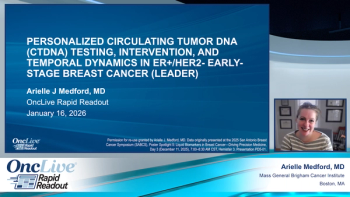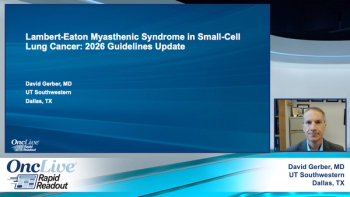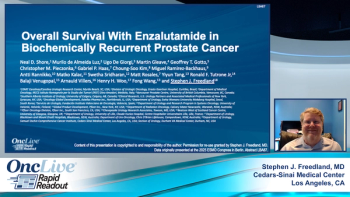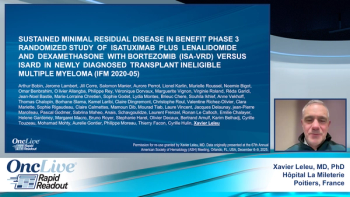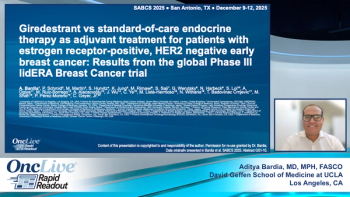
Rapid Readout: Trastuzumab Deruxtecan (T-DXd) Versus Trastuzumab Emtansine (T-DM1) in Patients With HER2+ Metastatic Breast Cancer: DESTINY-Breast03
Sara A. Hurvitz, MD, discusses findings from the DESTINY-BREAST03 trial that were presented at the 2021 San Antonio Breast Cancer Symposium that compare trastuzumab deruxtecan (T-DXd) with trastuzumab emtansine (T-DM1) for patients with HER2+ metastatic breast cancer.
OncLive® Rapid Readout from San Antonio Breast Cancer Symposium: Trastuzumab Deruxtecan (T-DXd) Versus Trastuzumab Emtansine (T-DM1) in Patients With HER2+ Metastatic Breast Cancer: Subgroup Analyses From the Randomized Phase 3 Study DESTINY-Breast03
Segment Description: Sara A. Hurvitz, MD, discusses findings from the DESTINY-BREAST03 trial that were presented at the 2021 San Antonio Breast Cancer Symposium that compare trastuzumab deruxtecan (T-DXd) with trastuzumab emtansine (T-DM1) for patients with HER2+ metastatic breast cancer. (
Segment Body Content:
T-DXd is a HER2-targeting antibody-drug conjugate approved for the treatment of pts with advanced HER2+ mBC based on the DESTINY-Breast01 study (NCT03248492). DESTINY-Breast03 (NCT03529110) is a randomized, multicenter, open-label, phase 3 study assessing the efficacy and safety of T-DXd vs T-DM1 in pts with HER2+ mBC previously treated with trastuzumab and taxanes. In the primary analysis, T-DXd demonstrated a clinically meaningful and statistically significant improvement in PFS vs T-DM1 (Corteset al, ESMO 2021). In this exploratory analysis, we provide additional efficacy and safety data in subgroups, including in pts with brain metastases (BMs).
Methods
- Pts were randomly assigned 1:1 to receive 5.4 mg/kg T-DXd or 3.6 mg/kg T-DM1 Q3W. Pts with clinically stable BMs were eligible. Lesions were measured per modified Response Evaluation Criteria in Solid Tumors version 1.1.
- The primary endpoint was progression-free survival (PFS) determined by blinded independent central review (BICR). PFS and overall response rate (ORR) were analyzed for subgroups. Sites of progression and post-end-of-study therapies were also investigated.
Results
- At data cutoff (May 21, 2021), 524 pts were randomly assigned to T-DXd (n=261) orT-DM1 (n=263). T-DXd demonstrated superior PFS by BICR vs T-DM1 (HR, 0.28 [95%CI, 0.22-0.37]; P=7.8 x 10-22); median (m) PFS by BICR was not reached (95% CI, 18.5-NE) for T-DXd compared with 6.8 mo (95% CI, 5.6-8.2) forT-DM1. For pts with stable BMs at baseline (n=82), mPFS was 15.0 mo (95% CI,12.5-22.2) for T-DXd vs 3.0 mo (95% CI, 2.8-5.8) for T-DM1 (HR, 0.25 [95% CI,0.31-0.45)].
- Overall, confirmed ORR for T-DXd was 79.7% vs 34.2% for T-DM1. For patients with stable BMs at baseline, ORR was 67.4% for T-DXd vs 20.5% forT-DM1.
- Consistent PFS and ORR benefit was also observed across other subgroups. At data cutoff, 84 (32.2%) pts treated with T-DXd had progressive disease (PD) vs 155 (58.9%) with T-DM1. In pts with stable BMs in the T-DXd arm, 48.8% of pts (21/43) had PD. In pts with stable BMs in the T-DM1 arm, 69.2%of pts (27/39) had PD.
- Data on sites of progression will be presented. Further analyses are underway and will be presented.
- Overall, the safety profile of T-DXd was manageable and comparable with its known safety profile. Adjudicated drug-related interstitial lung disease/pneumonitis was reported in 27 (10.5%) pts treated with T-DXd and 5 (1.9%) pts treated with T-DM1 overall, with no grade 4 or 5 events. Additional new safety data will be presented.
Conclusion
DESTINY-Breast03, the first-reported randomized phase 3 trial comparing T-DXd to standard of care, met the primary endpoint with T-DXd demonstrating superior PFS vs T-DM1 and T-DXd had a manageable safety profile. In this exploratory analysis, consistent PFS and ORR benefit with T-DXd vs T-DM1 was observed across subgroups in pts with HER2+ mBC previously treated with trastuzumab and taxane, including in pts with BMs.


